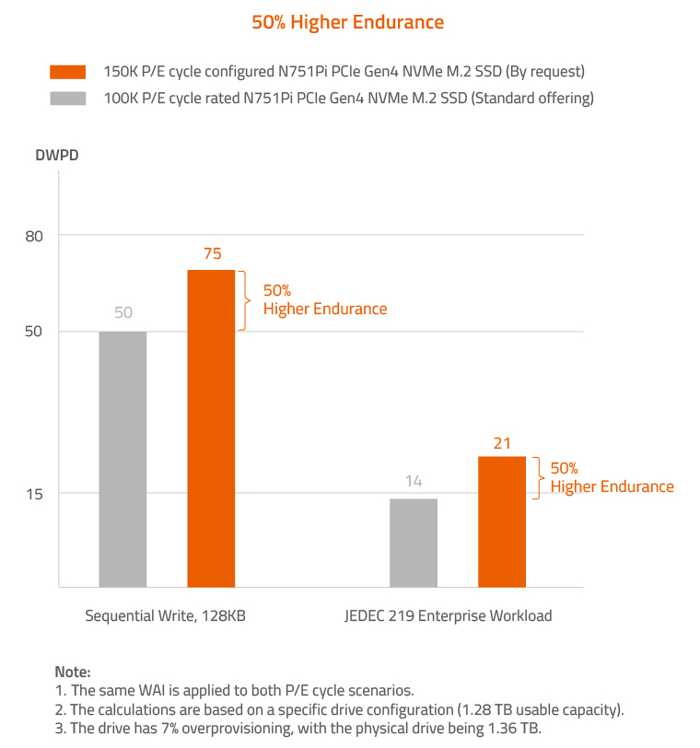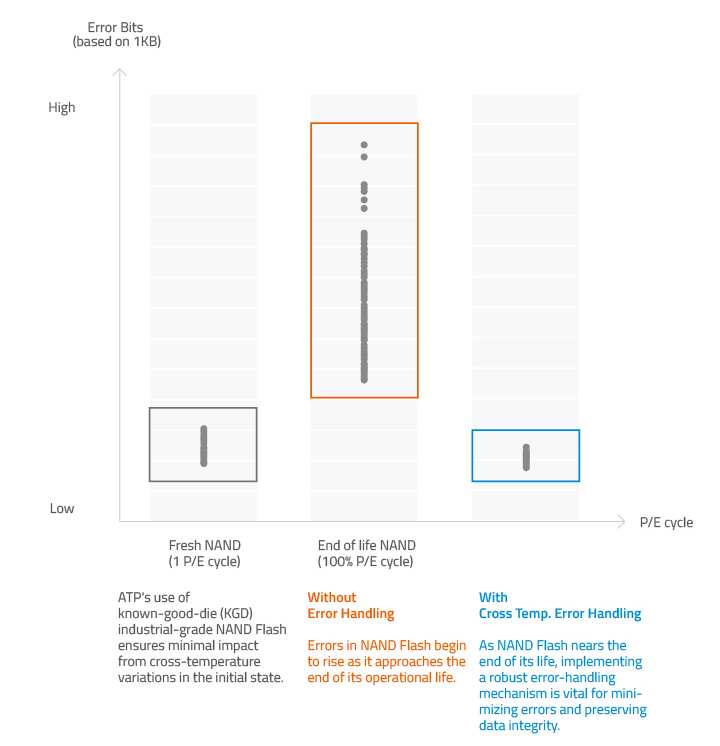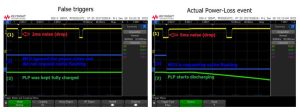ATP Industrial N751Pi PCIe Gen4 NVMe M.2 2280 SSDs with 125°C Operating Temperature Range
Comes with standard high endurance rating of 100,000 P/E cycles but can be further configured upon request to achieve endurance of 150,000 P/E cycles, 50% increase.
This is a Press Release edited by StorageNewsletter.com on August 30, 2024 at 2:01 pmATP Electronics, Inc. launches the N751Pi PCIe Gen4 NVMe M.2 2280 SSDs, which set a standard with unmatched endurance among industrial SSDs configured with pseudo single-level cell (pSLC) NAND.
The 150,000 P/E cycling configuration of NAND was achieved, thanks to a combination of the company’s strengths – from the use of prime NAND package, stringent NAND IC characterization and 100% NAND screening and validation capabilities, to ATP’s own-developed firmware, specialized hardware configurations, and technologies.
Thanks to their endurance and ability to operate in extreme temperatures, the N751Pi SSDs are for mission-critical and write-intensive applications in harsh environments, rugged conditions, and intense workloads.
Highest-endurance industrial SSD in market
They come with a standard high endurance rating of 100,000 P/E cycles but can be further configured upon request to achieve an endurance of 150,000 P/E cycles – a 50% increase. This enhancement translates to a 75 Drive Writes Per Day (DWPD) for sequential write workloads and 21 DWPD for JESD219A enterprise workloads, all supported by a 5-year warranty.
 Superior data retention
Superior data retention
With 100% P/E cycles, the N751Pi SSD can store data for up to a year at 55°C, outperforming other storage devices with similar P/E cycles. This data retention capability makes the N751Pi SSD a choice for applications requiring long-term data preservation under challenging environmental conditions.
Thermally engineered for 125°C cross-temperature operating range
From IC selection/screening to firmware optimization and hardware configuration, these SSDs are thermally engineered at every level.
Industrial-grade prime die
Rigorous NAND IC screening ensures top-quality components for extreme conditions
Advanced firmware configuration:
Thermal throttling:
The SSD intelligently adjusts its workload to maintain maximum sustained performance and throughput while preventing overheating. This dynamic approach optimizes performance within safe temperature ranges.
Cross-Temperature error handling:
The company has developed technology to mitigate errors that can occur when SSDs operate across varying temperatures. This is particularly important for scenarios where data is written at low temperatures (-40°C) but read at high temperatures (85°C), which can increase error rates and potentially compromise data integrity over time. The firm’s solution helps maintain data integrity even as the NAND approaches the end of its operational life.
 Customizable heatsinks
Customizable heatsinks
For better performance in harsh environments, the company offers customizable heatsink options based on customer requests or joint validation results. Available options include 4, 8mm, and copper foil heatsinks.
Hardware-based power loss protection with MCU and PLP circuitry
ATP adoption of microcontroller units (MCUs) in SSDs enhance reliability, performance, and adaptability by enabling advanced power management, data integrity protection, and real-time optimization of drive operations.
MCU in action: Input Power Noise De-glitch mechanism that accurately
distinguishes between actual power loss events and temporary power instabilities.
This prevents false triggers that could cause unnecessary cache flushes
or SSD freezes due to misinterpreted power fluctuations.
Click to enlarge
Enhanced TLC configuration offering: N651Si/N651Sc
It provides a middle ground for applications that require better-than-average TLC performance and endurance, but do not necessarily need the extreme endurance of pSLC.
This version outperforms other TLC offerings on the market and includes all the advanced features of the N751Pi Series, with capacities ranging from 240GB to 3.84TB.
Product specs:
|
PCIe Gen4 NVMe M.2 2280 SSD |
||||||||
|
Product Line |
Premium |
Superior |
Value |
|||||
|
N751Pi |
N751Pi |
N651Si / N651Sc |
N601Sc |
N601Vi / N601Vc |
||||
|
Interface |
PCIe G4 x4 |
|||||||
|
Flash type |
3D TLC (pSLC mode) |
3D TLC (pSLC mode) |
3D TLC |
3D TLC |
3D TLC |
|||
|
Form tactor |
M.2 2280-D6-M1 |
M.2 2280-D2-M |
M.2 2280-D6-M1 |
M.2 2280-D2-M |
M.2 2280-D6-M1 |
M.2 2280-D2-M |
M.2 2280-D2-M |
M.2 2280-S3-M |
|
Operating temperature |
-40°C to 85°C |
-40°C to 85°C / 0°C to 70°C |
0°C to 70°C |
-40°C to 85°C / 0°C to 70°C |
||||
|
Power loss protection options |
Hardware + firmware based |
Firmware based |
Hardware + firmware based |
Firmware based |
Hardware + firmware based |
Firmware based |
Firmware Based |
Firmware Based |
|
Optional SED features |
AES 256-bit encryption, TCG Opal 2.0 |
|||||||
|
Capacity |
80GB to 640GB |
1.28TB |
80GB to 640GB |
1.28TB |
240GB to 1.92TB |
240GB to 3.84TB |
240GB to 1.92TB |
240GB to 1.92TB |
|
Performance |
||||||||
|
Sequential read (MB/s) up to |
6,450 |
6,450 |
6,450 |
6,450 |
6,450 |
6,450 |
6,450 |
5,000 |
|
Sequential write (MB/s) up to |
6,050 |
6,100 |
6,050 |
6,100 |
6,050 |
6,050 |
6,050 |
4,300 |
|
Random reads IO/s up to |
1,090,000 |
1,050,000 |
1,090,000 |
1,050,000 |
1,091,000 |
1,091,000 |
1,095,000 |
800,000 |
|
Random writes IO/s |
1,107,000 |
1,200,000 |
1,107,000 |
1,200,000 |
1,245,000 |
1,245,000 |
1,244,000 |
1,100,000 |
|
Endurance and Reliability |
||||||||
|
Endurance (TBW)2 up to |
90,000TB |
180,000TB |
60,000TB |
120,000TB |
9,230TB |
17,930TB |
5,700TB |
4,175TB |
|
Reliability |
>2,000,000 hours |
|||||||
|
Others |
||||||||
|
Dimensions (mm) |
80.0 x 22.0 x 3.85 |
80.0 x 22.0 x 2.4 |
||||||
|
Certifications |
CE, FCC, BSMI, UKCA, RoHS, REACH |
CE, FCC, BSMI, UKCA, RoHS, REACH, UL |
||||||
|
Warranty |
5 years |
2 years |
||||||
|
1. M.2 2280-D6-M form factor (max height: 3.85mm), offers Hardware Based Power Loss Protection. M.2 2280-D2-M form factor (max height: 3.6mm), provides Firmware Based Power Loss Protection. |
||||||||















 Subscribe to our free daily newsletter
Subscribe to our free daily newsletter

